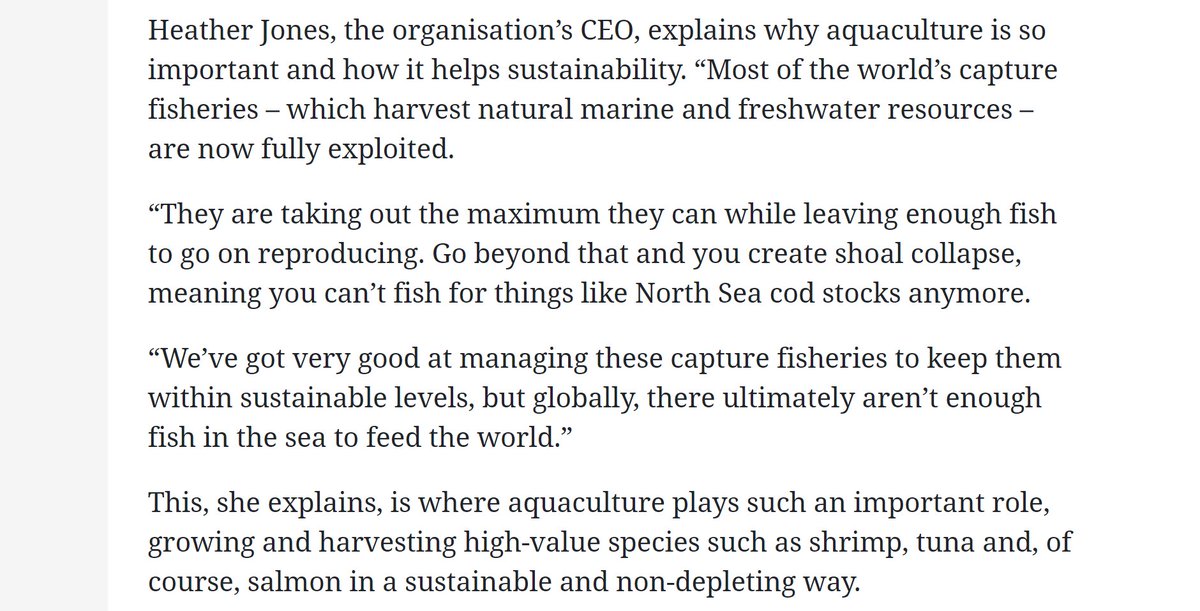I can& #39;t deal with this industry PR. I mean no ill to scientists working at SAIC and wider industry, but underlying the & #39;feed the world& #39; rhetoric in this article is a backdoor agenda for privatising and dangerously de-wilding our seas. Personal thread... https://www.heraldscotland.com/news/18773058.future-fish-stocks-scotland-bank-sea-change-attitudes/">https://www.heraldscotland.com/news/1877...
As many centuries-old fisheries have declined, investment in salmon farming has supplanted efforts to sustainably harvest Scotland& #39;s wild sea fish. The article contends our wild fisheries are & #39;fully exploited& #39;. This is wrong + deeply skews the policy choices available...
Respecting ecosystems with well-managed wild sea fisheries can be hugely productive and is currently badly *under-exploited*. Heather Jones of SAIC cites example of North Sea cod, but fails to explain that it is currently poorly managed and therefore could & #39;produce& #39; more fish...
If we were rebuilding wild populations (rather than exploiting them against scientific advice...) the North Sea could yield over twice current sustainable catch levels. And let& #39;s not forget the west coast - where cod populations have collapsed... https://www.theguardian.com/environment/2011/sep/30/uk-cod-collapse-overfishing">https://www.theguardian.com/environme...
50 years ago, approx 8,000 tonnes of cod were landed annually on the west coast https://www2.gov.scot/Resource/Doc/1061/0054758.pdf">https://www2.gov.scot/Resource/... But currently scientific advice remains zero-catch - populations are low with continued bycatch of juveniles one of the pressures likely suppressing stock recovery...
But if we protect coastal cod spawning and nursery grounds, halt ongoing bycatch/discards in the bottom-trawl fisheries, these other fisheries would rebound and provide more fish to & #39;feed the world& #39;... or Scotland at least....
We need priority investment in sound management of our wild capture sea fisheries, not continued state support for multinational fish farm companies. These companies secure leases *in perpetuity* over our seabed, displacing and squeezing out inshore fisheries, perhaps forever....
The externalised costs of the salmon farm industry (economic + social) are huge. How do you put a price on the loss of centuries-old livelihoods? And yet salmon farm industry continues to pursue an aggressive growth strategy....
There are many challengeable assumptions in the article (that one kilo of feed produces one kilo of farmed salmon), the glaring absence of any reference to potential closed containment solutions. But the bigger point is what is the cost of all this....?....
The salmon farm industry is often touted as delivering important rural jobs, but how sustainable are these jobs? What jobs are not being created or are lost because of its impacts? What is long-term environmental damage? What is the real cost-benefit..?... https://twitter.com/siftscotland/status/1254743506310045697">https://twitter.com/siftscotl...
Unless our inshore fisheries are given the support they need to be well managed, the salmon farm industry will continue to expand unopposed at the expense of many other coastal livelihoods, polluting our sea lochs... ( https://theferret.scot/fish-farm-pesticide-pollution-rise-2019/).....">https://theferret.scot/fish-farm...
... and endangering the very genetic integrity of our wild salmon meaning that this wild fish - a symbol of Scotland& #39;s natural wealth - caught by net and line for centuries around our coastline could become locally extinct... https://www.facebook.com/permalink.php?story_fbid=3202571613175476&id=119300654835936">https://www.facebook.com/permalink... https://twitter.com/joe_crowley/status/1315641311458975744">https://twitter.com/joe_crowl...
The article at the top of this thread rehashes the perpetual mirage of tech/innovation that will supposedly solve the salmon farm industry& #39;s environmental impacts or glosses over them entirely. At what point do we acknowledge the current production model is flawed...?...
The Scottish Parliament& #39;s inquiry urged reform in October 2018 saying that action was needed before the industry expanded. And yet over the past two years planning applications for new farms have continued with regulatory control lagging behind... #Summary-of-conclusions-and-recommendations">https://digitalpublications.parliament.scot/Committees/Report/REC/2018/11/27/Salmon-farming-in-Scotland #Summary-of-conclusions-and-recommendations">https://digitalpublications.parliament.scot/Committee...
Solutions? Halt open net cage salmon farm expansion. Investment in land-based alternatives. Consumer activism. And serious, non-tokenistic investment in fair governance and management of our wild sea fisheries.
Wild, healthy ecosystems are productive... https://youtu.be/XdNJ0JAwT7I ">https://youtu.be/XdNJ0JAwT...
Wild, healthy ecosystems are productive... https://youtu.be/XdNJ0JAwT7I ">https://youtu.be/XdNJ0JAwT...

 Read on Twitter
Read on Twitter


